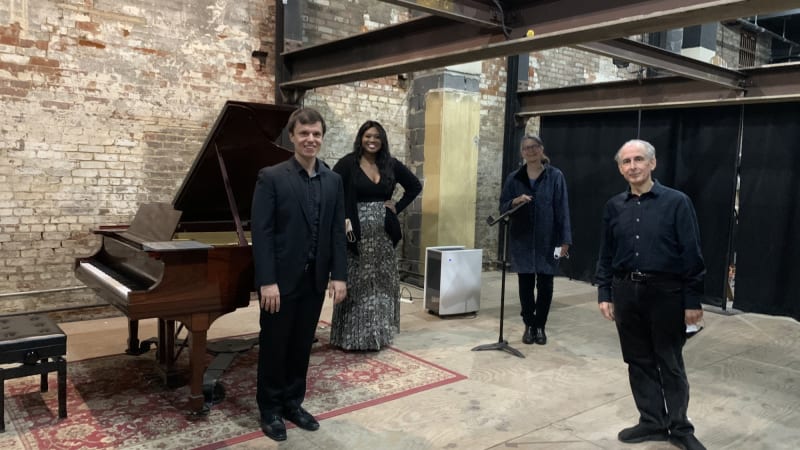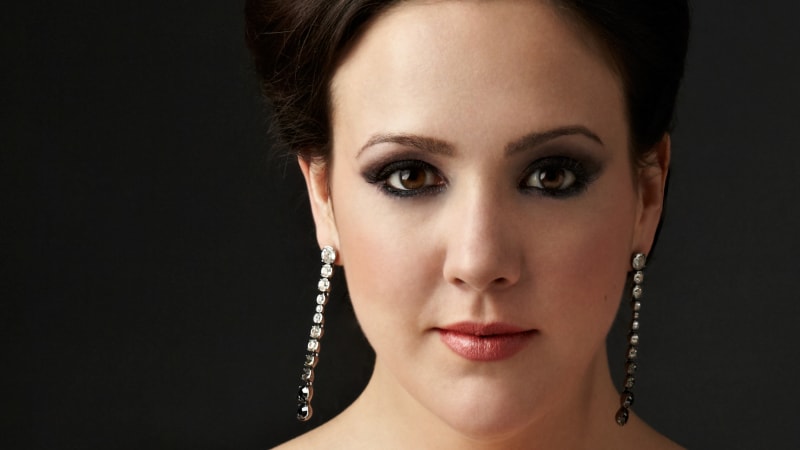Reflections on the Return to the Stage
May 17, 2021
The Chamber Music Society of Lincoln Center's Summer Evenings Outdoors program on Saturday, May 15 was its first live performance on the Lincoln Center campus since March 2020. There was a collective sigh of relief as CMS made its triumphant retun to the stage, and once again experienced the energy of live audiences, sharing the music that means so much to so many.
With this concert, CMS heralds a new era for the organization, and for the performing arts in general, and looks forward to the 2021-22 season.
A highlight of the opening Summer Evenings Outdoors concert in Damrosch Park was the opportunity to hear soprano Angel Blue sing the world premiere of Water Songs, composed by Bruce Adolphe, CMS's resident lecturer and the piano puzzler on public radio.

Angel Blue starred in the Metropolitan Opera's acclaimed production of Porgy and Bess, and it was the announcement of that production that piqued Adolphe's interest. "I am an avid fan of the Metropolitan Opera and when I saw that Gershwin's Porgy and Bess would get a new production in the coming season, I started to read articles about Angel Blue, who would be singing Bess. As I read about her wildly popular concerts, I noticed that she had been singing my song Valley Girl in Love very often, including it in most of her recitals, and also that she had recorded it," recalls Adolphe.
Valley Girl in Love is a song from the cycle A Thousand Years Of Love, commissioned 23 years ago by the Millennium Consortium/Music Accord and premiered by the Chamber Music Society of Lincoln Center on October 15, 2000 in Alice Tully Hall with Bruce Adolphe at the piano and soprano Sylvia McNair.
Angel Blue was introduced to Adolphe's music in college. "I sang his song cycle A Thousand Years of Love when I was a junior at the University of Redlands," she said. "I completely fell in love with his music. We met in 2019, and he so graciously offered to write a song cycle for me, and now we have Water Songs! What an honor!! I feel very privileged to sing his music."
Adolphe says of the new song cycle, "Water Songs is a set of six songs about water -- ranging from rain and floods to the metaphorical, and from the amount of water in cucumbers to water in the human brain. Scored for soprano and piano, the poems are by Rumi, Katherine Barrett Swett, Shakespeare, Emily Dickinson, and James Joyce, and there is also a song set to a list of government statistics about water. I met the poet Katherine Barrett Swett through her son, Nicky Swett, who was working with us at CMS. It was her moving poem about floods, written after Hurricane Katrina, that set me on the path of writing songs about water."
The road to this world premiere has not been an easy one, as Adolphe explains. "Angel had many opportunities to sing the premiere of Water Songs but those concerts were canceled due to the pandemic. Angel, pianist Bryan Wagorn, and I were thrilled to present the piece in an in-person event for CMS as part of Restart Stages."
Blue shares a similar excitement in returning to perform for live audiences. "Performing again for a live audience means more to me than I can express. The real truth though is that I never really left the stage, I just left the physical stage with an audience. However, I've been performing throughout the pandemic, just in a different capacity. The live performance will be very special."
Knowing that the long-delayed premiere would finally take place in front of a live audience inspired Angel Blue. "This work has a new meaning to me than when it was first conceived," said Blue. "It feels like the songs have come to life over the past few weeks. Working with the pianist Bryan Wagorn has been very helpful in finding different colors and nuances within the music. For me, the songs really came to life once I knew that I would be performing them for a live audience. I've missed that connection.
"For me, the songs really came to life once I knew that I would be performing them for a live audience. I've missed that connection."

After the performance on May 15th, Adolphe wrote to his CMS colleagues about the premiere: "I was thrilled by the gorgeous premiere sung brilliantly by the utterly amazing Angel, with Bryan's sensitive artistry at the piano. Working with Angel and Bryan was a pleasure, and witnessing Angel go deeper and deeper into the music and poetry was wonderful and profoundly satisfying. Angel and Bryan made the work their own—so expressive, free, and personal. It means a lot to me that this premiere —not originally scheduled for CMS, after the inevitable cancellations due to the pandemic — became part of this remarkable and historic CMS event."
As we celebrate the works like Water Songs that are finally reaching live audiences after facing multiple hurdles during the pandemic, we think about other ways in which the pandemic has affected the performing arts. Like many musicians, Adolphe confronted the loss of normalcy and the absence of freelance work, and this affected his ability to concentrate on composing.
"At first, the pandemic shut down the arts and with that, it crushed the spirits of many artists. I know I felt numb and so did many of my composer friends. Music is naturally communal and even the solitary act of composing is grounded in the idea of eventual performance, which means working with musicians and connecting with audiences. Eventually, the shock of this unfathomable nothingness led me, and probably all creative artists, to live more and more in our imaginations. It is our work to imagine things. The act of imagining brings energy and joy. After all, all artistic and creative work is problem solving -- and this was one big problem. The pandemic's sorrows and grief can, do, and will find expression in the lineaments of new artistic work and the arts will continue to respond to reality."
Adolphe continues: "During most of 2020, I kept busy by making Inspector Pulse@Home videos every week (with my daughter Katja Stroke-Adolphe) and by writing the third edition of my book The Mind's Ear for OUP. But composing felt far away, for the first time in my life. Then I thought that perhaps if I could find a poem about yearning for normalcy, for being with friends, that I could ease back into composing by writing one song."
"But composing felt far away, for the first time in my life. Then I thought that perhaps if I could find a poem about yearning for normalcy, for being with friends, that I could ease back into composing by writing one song."
By collaborating with the poet Pireeni Sundaralingam, Adolphe found a way back to composing. Together they wrote the song Gather Round the Table that so beautifully captures the emotions many of us have felt throughout this past year.
Since we were all Zooming all the time, he set up a Zoom with the poet/scientist Pireeni Sundaralingam, who lives in California. They had met at the Salzburg Global Seminar at the session on neuroscience and the arts a few years earlier. Sundaralingam loved the idea and wrote the poem Gather Round the Table. Adolphe set it to music and then thought about who might sing it. It occurred to him that his family had been excitedly looking forward to seeing Janacek's Katya Kabanova at the Met, but that it was canceled along with everything else. The wonderful soprano Susanna Phillips had been scheduled to sing the title role. He knew Susanna from the McKnight Center Chamber Music Festival, in which we both participated, directed by [CMS pianist] Anne-Marie McDermott.

Soprano Susanna Phillips has performed at CMS before to thrilled audiences and the organization is delighted to welcome her back for CMS's 2021-22 season where she will perform Handel's “Sweet Bird” for Soprano, Flute, Cello, and Continuo from L’Allegro, il Pensieroso ed il Moderato May 15 and 17 for live audiences at Alice Tully Hall.
Susanna agreed to record the song with pianist Myra Huang, using Susanna's own apparently superb recording equipment, a very pandemic situation. "As soon as I heard back from her," writes Adolphe, "I rewrote some of the song to suit Susanna's voice better, and that led to my making many small improvements in the score. Susanna and Myra recorded it when they could get together safely, and sent me the audio file, which is a remarkably beautiful performance by both of them. Together, they found every nuance in the music, and Susanna brought the poem and music to life with extraordinary sensitivity. This piece has not yet been performed live with an audience."
While we eagerly await a live performance of this moving work, CMS is happy to share the recording here.
Gather Round the Table
Performed by Susanna Phillips, soprano; Myra Huang, piano
Composed by Bruce Adolphe
Lyrics by Pireeni Sundaralingam
Bruce Adolphe Gather Round the Table
Download the full text here.
As life gradually returns to normal, we can find comfort in musical connections like these that have appeared over the course of the year, and the reminder that music and the arts will persevere. As Co-Artistic Directors David Finckel and Wu Han said, "The 'power of music' is spoken of often, almost to the point of cliché. But to what else can be attributed the fact that during these challenging times, CMS has actually grown stronger, in every way?"
CMS is itself a conductor of creativity and inspiration, drawing together composers and performers who are enabling this cherished art form to remain strong and vibrant. And as we look ahead to a new season, there is hope and excitement.
And as we celebrate the return of live music and hold close the people we haven't embraced in far too long, we also hold close the memories of those lost, and continue to thank those who have helped us survive this difficult time.
As Bruce Adolphe says in closing, "We will never forget the suffering and deaths caused by this pandemic. As with war, we now need the arts more than ever -- an eerily familiar idea."
So "Gather round the table. Light a simple candle" and join us as we journey into a new era. Together.